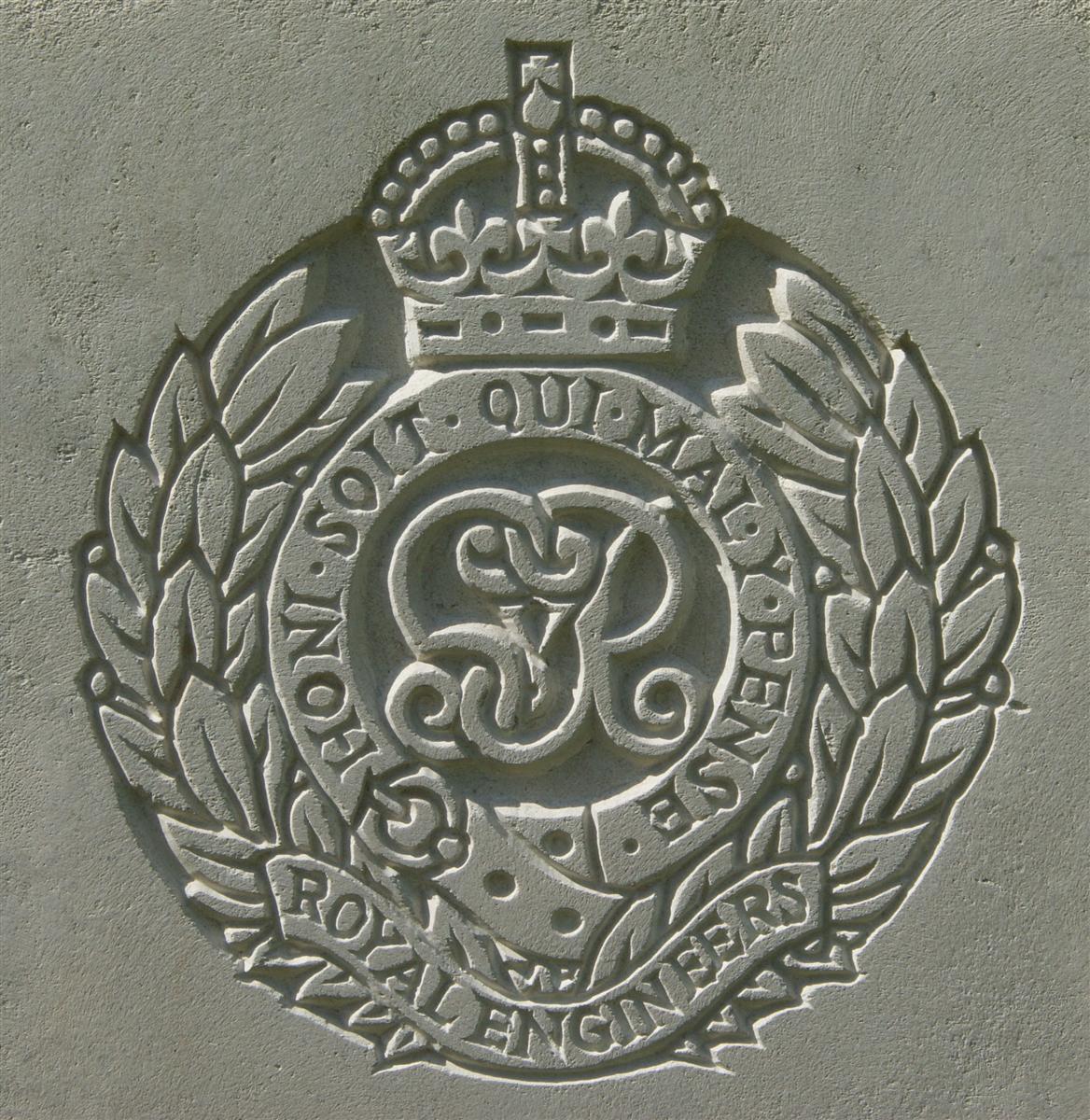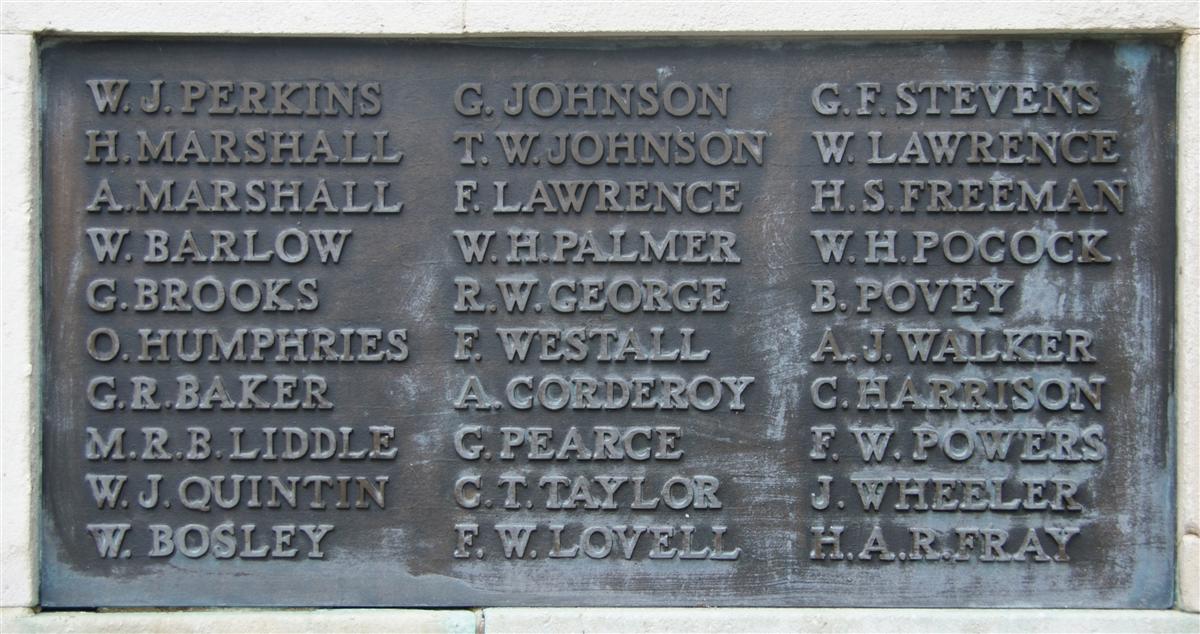Owen Vincent Humphrys
Sapper 66167 Owen Vincent Humphrys, 22nd Signalling Company, Royal Engineers
Owen was born in Savernake, Wiltshire and was baptised there on 12 July 1895. He was the son of John Humphries, the local schoolmaster, and his wife Mary Anne née Searle.
The surname is recorded on the memorial as Humphries, but the majority of records show it as the more unusual spelling - Humphrys – including his military record, and his birth, marriage and death registrations.
Owen grew up in Savernake, no doubt being educated at Savernake School as a pupil of his father, and, perhaps more gallingly, his elder sister Edith Searle Humphrys (born 1881) who worked as a school assistant. Edith was Owen’s only sibling.
After he left school he found employment as a trainee at the Post Office; he remained resident in Savernake and may have worked at the village post office, but it is very possible that he made the journey into Marlborough to work at the much larger Post Office there.
His father retired and the family moved to Fleet in Hampshire, perhaps following an improved employment opportunity for Owen. His mother, Mary Ann, died there in 1907 aged 62.
On 30 August 1911 Owen married Evelyn Ellen Oakley, a girl he had met while in Fleet, where they married. Soon after they moved to Newbury, where he worked as a telegraphist at the Post Office. While in Newbury they lived in Hambridge Road (in the parish of Greenham). In 1912, there first child, Sidney John Oakley, was born; sadly he died soon after birth. The following year there was better news, their second son, Lionel James, was born and survived.
After war was declared in August 1914 there was a huge influx of volunteers into the Army which resulted in the creation of several ‘Kitchener’ armies made up of new ‘Service’ infantry battalions of the traditional regiments with associated artillery, medical, engineering, logistic, etc support. The operative unit of the WW1 army was the division, which was a self-contained force with all the specialisms needed for the division to operate in the field. The Amry was overwhelmed by the numbers enlisting, but was able to resolve most of the issues fairly quickly. It was possible to train an infantryman or a gunner pretty quickly, even a cavalryman or a driver could be turned out in a few months, but there were skills that required aptitude and experience that could not be developed quickly enough to meet the needs. One key skill was telegraphy. Communications were vital for the efficient operation of a division of some 20,000 men and telegraphy (morse code operators) were key, they had to be proficient enough to ensure that communication was accurate and fast.
The Army realised that the Post Office had a large number of experienced, highly proficient telegraphists. In order to persuade these men to enlist they were offered very special terms of enlistment – they would go into the army as telegraphists (not fighting troops) and they would continue to receive their Post Office pay (higher than the Army pay for their rank).
Owen was among those who volunteered under these terms and enlisted on 22 January 1915. The following day his telegraphic skills were tested and he was passed as ‘proficient’. After a short spell learning the army’s ways he was posted to 22nd Division, one of the new Kitchener Army units.

The badge of the Royal Engineers - as used bon CWGC headstones. |
His role within the Army was pretty much the same as his civilian job –he was in the 22nd Signalling Company, Royal Engineers – the divisional signallers. He operated at divisional headquarters transmitting and receiving messages from subordinate units and from higher echelons. There were instances of divisional HQs being shelled or overrun, but, in general, this was a pretty safe place to be.
The 22nd Division was eventually deemed fit for active service and sent to France in early September 1915 (Owen landed there on the 4th), but it was not in France for long. On 27 October it began the move south to Marseille from where it sailed for Greece. An Anglo-French force had landed in Salonika a few weeks earlier with the aim of dissuading Bulgaria from joining the Central Powers (Germany, Austria-Hungary, and the Ottoman Empire) against them. This was a failure, Bulgarian declared war and mobilised to attack Serbia. Attempts to support their Serbian allies against invasion failed and, by December, the allies were fighting to establish a front on Greek territory.
Fighting continued in a low-key manner, with occasional flare-ups, until 1918 when the Allies finally broke through the Bulgarian lines and the Bulgarians sued for peace. An armistice came into effect on 30 September 1918.
Throughout the campaign sickness was as much, or more, of a problem than the fighting, a great many men fell victim to malaria. This was reflected in the name of the journal of the Salonika Association for veterans of the campaign, which was entitled The Mosquito. Local newspaperman, George Willis of the Newbury Weekly News, edited the publication for many years, until it’s final issue in 1964.
Owen seems to have avoided malaria but seems to have had some serious dental problems that involved lengthy treatment between August and October 1917. The next entry in his medical record shows that he was admitted to hospital on 3 December 1918 suffering from influenza – he had caught the dreaded ‘Spanish flu’. This strain of the influenza virus killed many millions that winter, not directly, but through secondary infections. Owen died in the 49th Stationary Hospital at Bralo, well away from the front in central Greece. He would have been treated initially at a Casualty Clearing Station near the front and moved south to the better-equipped Stationary Hospital as his condition deteriorated.
 Owen's name on Newbury War Memorial. (middle left) |
He was buried in grave 100 at Bralo British Cemetery in central Greece.
Locally he is remembered (as O Humphries) on tablet 5 of the Newbury Town Memorial and (as O V Humphries) on the splendid memorial window in Greenham Church.
He is also remembered, as O V Humphrys, on the brass plaque in the Newbury sorting office that records the names of local postal workers who died in the Great War. Owen’s name was also added when his father’s headstone was erected over his grave in Westbury churchyard following his burial on 2 December 1923.

Find a memorial :
| Died this day: | |
| 02 March 1918 | |
| N G Burgess | |
| Newbury |

Like this site? Show your appreciation through a donation to a great charity.